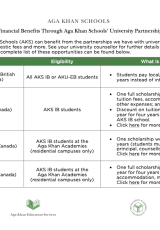The University of British Columbia partners with Aga Khan Academies on teacher development
“Being a top student at university made me feel like I knew a lot, but when I came here, I realised I don’t know as much as I thought, and I had to be humble and begin learning again,” says Johnson, who is currently teaching English language and literature at the Aga Khan Academy in Mombasa. He is one of six young teachers who were picked from a pool of high performing teacher education graduates in various Kenyan universities to undergo a rigorous 18-month advanced professional learning programme known as the Aga Khan Academies’ Teacher Preparation Programme (TPP).
The TPP initially involves the selection of 18 candidates to take part in an intense three-week training institute, after which six to eight candidates are appointed to an 18-month paid internship in an Academy. During their internship, these individuals participate in the full range of activities and responsibilities expected from an Academy teacher and are trained and mentored by senior colleagues to teach the International Baccalaureate (IB) curriculum.
"It is exciting to observe the transformation the interns go through as they begin to question their own understanding and embrace reflective practice," says TPP Coordinator Tom Abuto. "The first few days are a humbling experience as the participants who have been competitively selected from top graduates in the country realise that there is still so much to learn about even the most basic of concepts in education."
In addition to exposing teachers to best practices in international education and preparing them to teach within the Aga Khan Academies network of schools, the TPP aims to create leading teachers with sophisticated pedagogical skills and a deep understanding of how students learn. Most importantly, the programme prepares the interns to be able to work to a high standard not only in IB schools but also in government schools, which enables them to contribute meaningfully to the ongoing improvement of education in the country.
Partnership with the University of British Columbia
Collaboration is a key aspect of the interns’ learning journey and one that Professor Carr highly appreciates. “I was most impressed by meeting [TPP] mentors and interns. It is amazing to see that it takes an entire organisation to develop these teachers,” she said.
The TPP interns teach at the Academy under the guidance of a senior teacher while gradually increasing their teaching load over the 18-month period. Johnson is grateful for the training he received from senior English teacher, Bernard Dudi. “There is that confidence that develops because the partnership with your mentor is not just about the classroom…it truly helps you understand the vision and mission of the Academies, and most importantly the application of the Aga Khan Curricular Strands in the IB curriculum,” reflects Johnson. Similarly, Bernard believes the interns’ fresh perspectives enrich the learning environment in the classroom and benefit both the students and senior teachers. “Johnson is so open-minded, and his attitude is that of always wanting to learn. He’s got the kind of mind that is set to grow,” states Bernard.
Learning best-practice teaching approaches
“The PBL approach results in individuals who have an intense passion for learning, a skill that makes them lifelong learners,” notes Tom.
The TPP interns initially struggle to practice problem-based learning during their training but become increasingly comfortable through the course of the internship. The PBL approach allows the interns to deepen their understanding of the theories and practices they were exposed to at university. As a result, they undergo a significant transformation in their views about themselves as teaching professionals. “To sum it all up, this programme has made me a lifelong learner,” says Johnson.
Empowering teachers through formal recognition of the TPP
The Teacher Preparation Programme has developed significantly over time, and the new partnership with UBC will facilitate its further expansion. In particular, the collaboration with UBC will enable the Aga Khan Academies to seek formal recognition for the TPP from the International Baccalaureate. This would mean that individuals like Johnson who successfully complete the internship would be eligible to register for an IB certificate in teaching and learning. With formal endorsement, the TPP would become the first school-based teacher professional development programme in the world to be officially recognised by the IB.
Such recognition would not only be a milestone achievement for the Academies, but it will also open doors for the interns. In addition to certification, Johnson believes that the confidence they develop through the training programme truly empowers them to seek coveted teaching roles both in Kenya and abroad.
“We can’t have great student leaders without having great teacher leaders,” says the Director of Academies, Salim Bhatia. A crucial aspect of the vision and mission of the Academies is to develop home-grown leaders, and valuable partnerships with credible institutions like UBC act as the catalyst to achieving that goal.
By Haifa Badi-Uz-Zaman
Newsletter readers please click here to return to the newsletter (browser version)
publications




